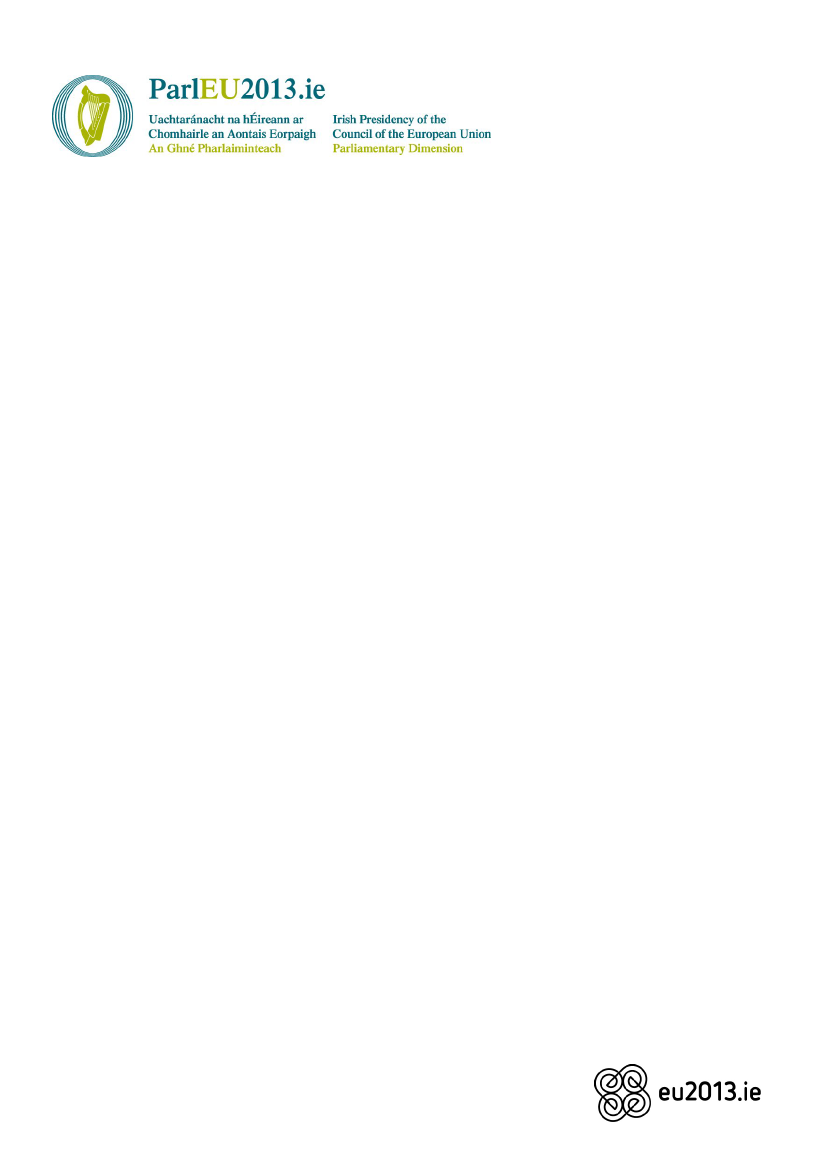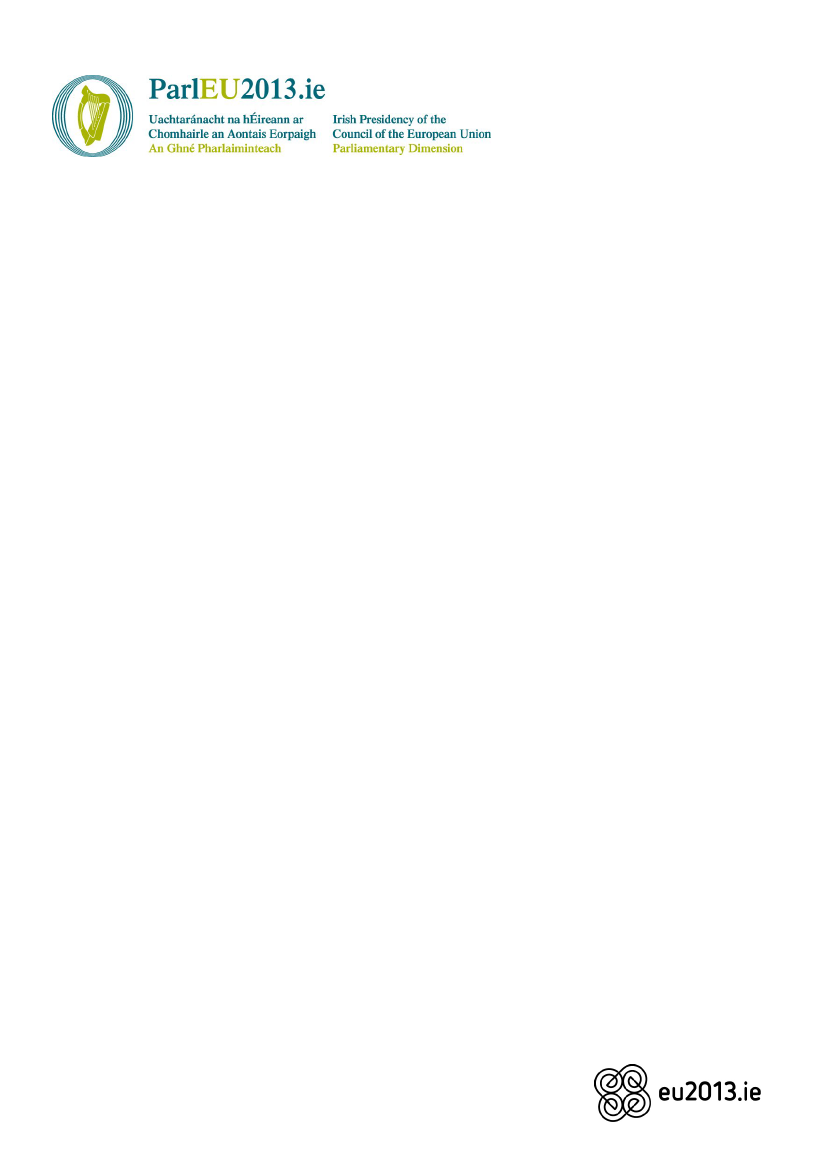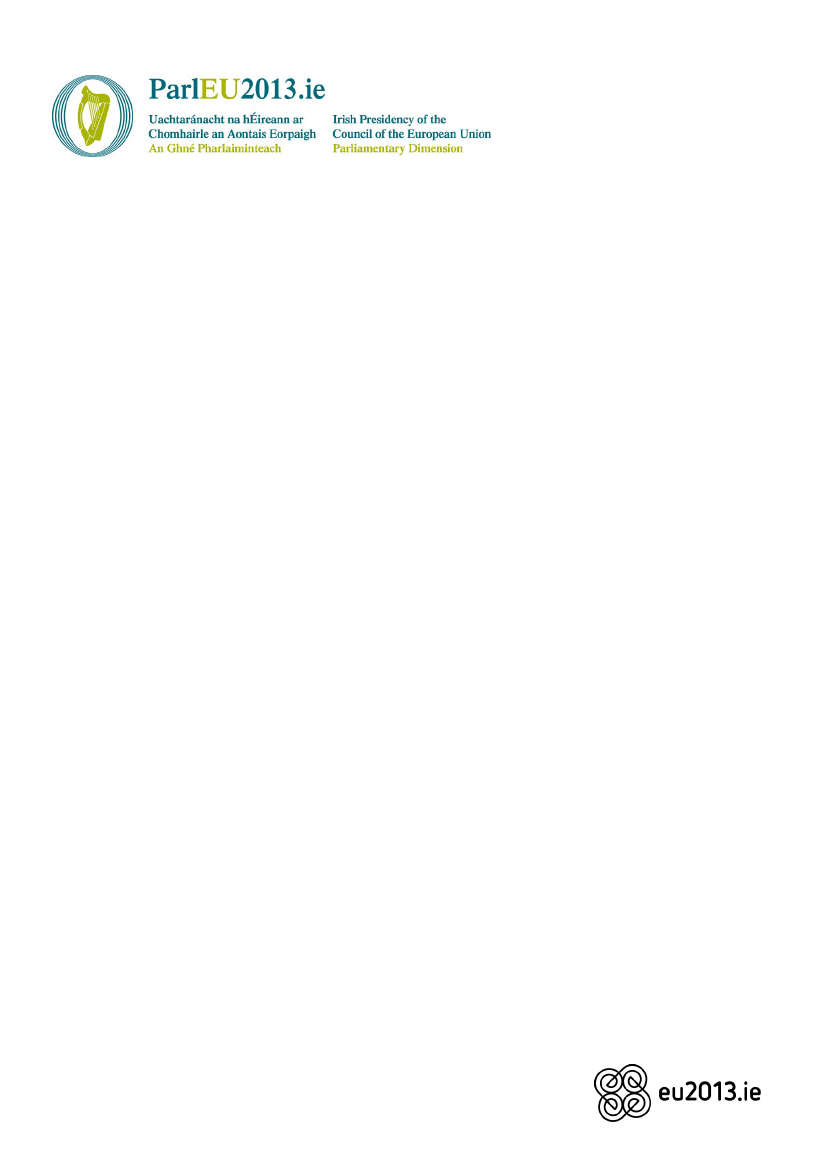Europaudvalget 2012-13
EUU Alm.del Bilag 496
Offentligt
CONCLUSIONS OF THE XLIX COSAC
Dublin, 23-25 June 2013
1. Bi-annual Report
1.1. COSAC welcomes the 19th Bi-annual Report prepared by the COSAC Secretariatand thanks the Secretariat for its work. The Report provides useful information onthe parliamentary involvement in the Economic and Monetary Union, theEuropean Semester and enlargement. It also examines the subsidiarity scrutiny inParliaments and documents the extent of interparliamentary cooperation relatedto this.2. Recent Parliamentary meetings
1. COSAC welcomes the Presidency Conclusions of the last Conference of Speakersof the EU Parliaments held on 21-23 April 2013 in Nicosia and expresses itssupport for the agreement reached on the establishment of a Conference, inline with Article 13 of the Treaty on Stability, Coordination and Governance inthe Economic and Monetary Union, which could be built on established modelsof interparliamentary cooperation upon the formula of the Conference on CFSPand CSDP. COSAC looks forward to the inaugural Interparliamentary Conferenceon Economic and Financial Governance of the European Union to be held inVilnius, 16-18 October 2013 and urges careful consideration of thearrangements for this and the follow on conference to be co-hosted in Brussels.2.1. COSAC welcomes the report from the informal meeting held in Copenhagen on 11March 2013 on the role of national Parliaments in the EU as a forum for opendiscussion and exchange of ideas.2.2. COSAC welcomes suggestions to use videoconferencing for interparliamentarycooperation and for the purposes of enhancing the exchange of informationbetween national Parliaments and the suggestion to draw on to a greater extentthe COSAC secretariat and national Parliament representatives in Brussels.2.3. COSAC notes the important role played by national Parliaments in the nationaldecision making process on EU affairs. Many countries have developed methodsand procedures on how to integrate EU affairs into the daily life and work ofnational Parliaments. These experiences and best practices can provideinspiration for others on how to improve EU scrutiny and strengthenaccountability also on a national level.Genuine Economic and Monetary Union
3.1. COSAC notes that most Parliaments actively debate key EMU documents and themajority of Parliaments scrutinise the European Council meetings and/orconclusions in some way. COSAC believes that more should be done to alsoencourage interparliamentary debate on these topics and the wider fundamentalissues of democracy in the EU. COSAC therefore calls on future Presidencies toexamine how best to do this, particularly in the context of the new conference onthe basis of article 13 of the Treaty on Stability, Coordination and Governance inthe Economic and Monetary Union.3.2. COSAC encourages Parliaments to make greater use of existing tools and to seekto develop new ones at national and European level to ensure the democraticlegitimacy of the EMU and in particular to ensure that democratic legitimacy andaccountability rest at the level where decisions are taken and implemented.3.3. COSAC encourages the European Parliament and the national Parliaments holdingthe Presidency of the EU Council in the first semester of the year to consider theconstructive comments made in the 19th Bi-annual Report in relation to theorganisation of the European Parliamentary Week.4.
Exchange of information between Parliaments on subsidiarity scrutiny
4.1. COSAC welcomes the continued development of procedures and practices relatingto the scrutiny of subsidiarity. It highlights, in particular, the increased exchangeof information between staff of different Parliaments; the greater cooperationamong National Parliament Representatives in Brussels; and the continued highlevel of attendance at interparliamentary conferences.4.2. COSAC welcomes the significantly increased exchange of information betweenParliaments and Chambers on subsidiarity scrutiny using a variety of exchangemethods and networks, in particular the IPEX database and National ParliamentRepresentatives based in Brussels. It is pleased to see the successfulintensification of interparliamentary exchange of information since the cominginto force of the Lisbon Treaty, in many cases contributing to specific scrutinyoutcomes. COSAC reminds national Parliaments of the importance of effectivelyexecuting subsidiarity scrutiny and encourages cooperation so that nationalParliaments may reach the thresholds when appropriate.4.3. In the context of this intensified activity, COSAC notes that further improvementscould be made, such as: the exchange of information between Parliaments at aneven earlier stage in the scrutiny process; improvements to the content of theIPEX website to cover the substantive reasons for breaching the subsidiarityprinciple and for Parliaments to ensure well-timed availability and accuracy ofinformation and to provide more detailed English and/or French summaries orEU Coordinator: Máirín Devlin, Telephone (direct) 00353 1 6183258, [email protected]
translations of important documents; and greater exchange of informationbetween Members of Parliaments in the forum and/or on the margins of COSAC.5.
Permanent Member of the COSAC Secretariat
5.1. COSAC recalls that the term in office of the current Permanent Member of theCOSAC Secretariat expires on 31 December 2013. COSAC underlines that theappointment of the new Permanent Member should take place during the LCOSAC, therefore, asks the Lithuanian Presidency to prepare for theappointment.5.2. COSAC also recalls that the present co-financing of the Permanent Member of theCOSAC Secretariat and the costs of running the office and website of COSAC willend on 31 December 2013. COSAC welcomes letters of intent from 22 nationalParliaments expressing their commitment for the co-financing for the followingtwo years, i.e. 2014-2015. Furthermore, COSAC welcomes the fact that thethreshold of a minimum of the national Parliaments of 14 Member States has beenreached. COSAC calls upon the remaining Parliaments/Chambers to renew theircommitment for the co-financing.



